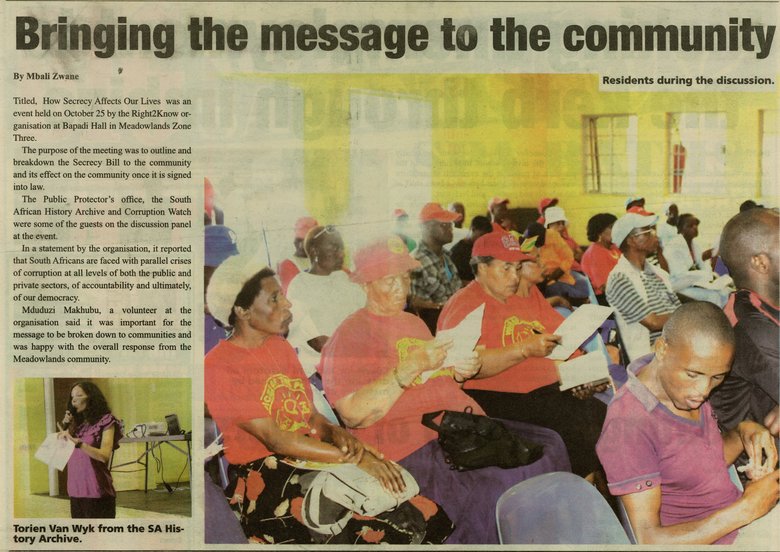'Corruption is happening right in the government’s offices'. This comment, made by a local resident, attending a Right2Know Campaign event hosted on Saturday, 25 October 2014, in Meadowlands, Soweto, captures the Meadowlands community’s experience of the effect of secrecy on service delivery.
 Various speakers from organisations represented at the event, such as the Office of the PublicProtector, Corruption Watch, the National Union of Metal Workers of South Africa and theSouth African History Archive (SAHA), each spoke about their role in the promotion of accessto information, particularly as relating to issues of service delivery and the protection and enforcement of socio-economic rights.
Various speakers from organisations represented at the event, such as the Office of the PublicProtector, Corruption Watch, the National Union of Metal Workers of South Africa and theSouth African History Archive (SAHA), each spoke about their role in the promotion of accessto information, particularly as relating to issues of service delivery and the protection and enforcement of socio-economic rights.
The drafters of the Constitution envisioned an open and transparent government that could be held to account by the citizens it serves. Section 32 of the Constitution, in furtherance of that vision, enshrines the right of access to information and the Promotion of Access to Information Act, 2000 (PAIA) was enacted to give effect to this right. Recently this legislation has been threatened by the tabling of controversial legislation such as the Protection of State Information Bill (commonly known as ‘the Secrecy Bill’). The keynotespeaker at Saturday’s event, Ms Dinkie Dube, the Gauteng Representative of the Office of the Public Protector, emphasised that the enactment of the Secrecy Bill, in its current form,would have significant, negative impact on the work of the Public Protector.Toerien van Wyk, Coordinator of SAHA’s Freedom of Information Programme (FOIP), spoke about various challenges and strategies aimed at finding advocacy solutions to problems created by a lack of transparency, and about the role of the right of access to information generally, and the use of PAIA specifically in fighting those problems.
Local residents attending the rally expressed frustration with what was characterised as an unresponsive, dishonest and inefficient government. It was clear that this perception is supported and perpetuated by a lack of access to the information that is necessary to empower this community to take on matters that affect them, such as evictions and the allocation of tenders.
Providing information enables people to create solutions to their problems and also dispels any misconceptions that may exist about those problems.
This event highlighted a clear need for more transparency specifically on the part of local government, both for the purposes of keeping communities informed, generally, about steps being taken to address their needs, but also to empower those communities to enforce their rights in instances where their local government is failing them.





